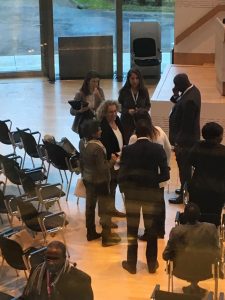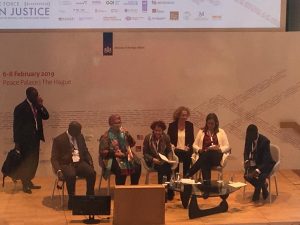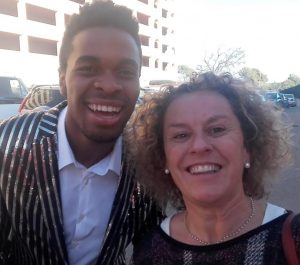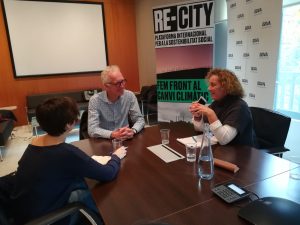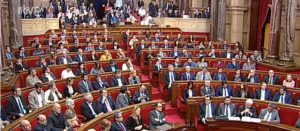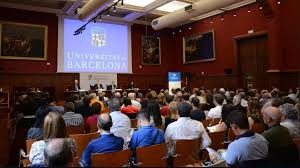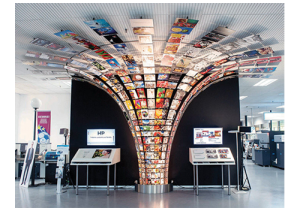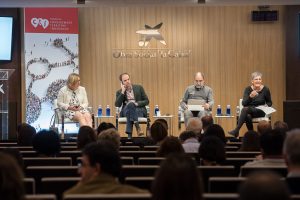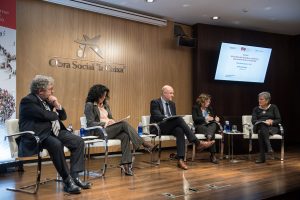
Category Archives: Current Affairs
Conference interpreter at the Peace Palace in The Hague
On 6, 7 and 8 February The Hague, in the incomparable setting of its Peace Palace, held a series of conferences to mark 2019 as the year dedicated to justice, contributing to the mobilisation and commitment to the fulfilment of SDG´s 16.3.
This will culminate in the High Level Political Forum in July and the SDG´s Summit in September, which will review progress towards SDG 16 and Agenda 2030.
The forum held this week in The Hague has discussed the opportunities and challenges in achieving the goal of justice for all, as well as strategies to accelerate access to justice at national and international level.
The forum was opened by Sigrid Kaag, Minister of Foreign Trade and Development Cooperation of the Netherlands, co-hosted with the Ministers of Justice of Argentina and Sierra Leone and the group formed by The Elders.
150 experts, mainly those who have contributed to the Working Group on Justice over the course of a whole year, met to discuss and strengthen the recommendations needed to access greater justice and the way forward.
Conference interpreter during the Operación Triunfo Christmas Gala 2018
The Christmas Gala by Operación Triunfo had a very special guest, the French singer Zaz, considered in France the new Edith Piaf.
Zaz (Isabelle Geffroy) has the spark, the joy, the rhythm and the desire to live of a young artist with a meteoric musical career. Zaz leaves no one indifferent. During the gala, she gave a wink to the second place, sharing with her a beautiful and catchy song in which she gives up on all material things in favour of a life of love, joy, humour, freedom and absence of cliches.
So much energy, so many young people together showing talent and a desire live to the fullest!
Conference interpreter during the presentation by Alistair Woodwards on climate change and health
According to Alistair Woodward, Head of Epidemiology at the University of Auckland, the rise in greenhouse gases already has serious health consequences.
This expert in public health and climate change visited Barcelona invited by the Catalunya Europa Foundation and BBVA. On the one hand, there are the direct effects, as a consequence of heat waves or floods, and of those natural systems that spread contagious diseases more easily in high temperatures. We also find, indirectly, social disturbances, such as migratory movements caused by droughts.
Finally, we have the effects of our actions to reduce climate change. And also the effects of our actions to reduce climate change. Right now the challenge is to find good policies for both the climate and health.
IConference interpreter during the opening lecture given by Peter Newman on climate change
Peter Newman, professor at the John Curtin University in Perth, Australia, was responsible for giving the opening conference of the series “Let’s face up to climate change”, organized by the Re-City platform, which will offer twelve conferences by different international experts until May 2019.
The series is promoted by the Catalonia Europe Foundation and the BBVA and the Barcelona City Council.
The opoening conference coincided with the publication of the special report of the UN International Panel on Climate Change (IPCCC), to which Newman belongs. The report warns that global warming of over 1.5ºC could have terrible consequences for the planet and warns of the need to act with “unprecedented measures” to avoid the irreversible damage caused by climate change. Despite the report, the professor was optimistic and hopeful in the conference he gave to a packed auditorium at the Antoni Tàpies Foundation in Barcelona: “I am hopeful that oil consumption can be reduced, and we have good examples, such as in Australia or Denmark, which show that it is possible,” said the Australian professor. “We need disruptive innovation to make cities better. For example, the autonomous vehicle without a driver, if it is not shared, is innovative but is not an improvement for the planet, whereas if shared mobility is applied, it becomes a disruptive innovation.
Newman presented more cases of good practices that are being carried out in other countries, such as Norway or China, where trains without tracks are already being tested, which run on rechargeable batteries and are more stable, less expensive and less polluting than trains or conventional transport.
Conference interpreter for the Parliament of Catalonia
One of the greatest democratic transformations of the 20th century was the achievement by women of both passive and active suffrage. In fact, we could say that democracy only materialised after the introduction of universal suffrage, i.e. when 51% of the population, until then excluded, came to have political rights, which are fundamental human rights.
Today, the objective of gender equality is recognised at international level as a central element for the development and progress of our societies. It must therefore involve all public authorities, and in particular parliaments, as the seat of popular sovereignty and a reflection of the society they wish to represent. However, there is still a long way to go before parliaments become leading actors in the fight for gender equality.
Currently, according to the latest data from the Inter-Parliamentary Union, women hold only 23.8% of the seats in all parliaments worldwide. The Catalan Parliament far exceeds this figure, with 42.9% of its members in the current legislature. This figure contrasts with the 5.4 (only seven women) in 1980, but is still insufficient to put an end to the existing male over-representation.
In patriarchal societies, gender power relations are reproduced in all spaces of social interaction, including political institutions. For this reason, the Catalan Parliament has launched a project that aims to banish patriarchy from the seat of popular sovereignty.
During the next 12 months an internal equality plan will make the Catalan Parliament one of the most advanced in Europe in terms of gender equality.
To ensure that equality between women and men is truly effective within the institution, the Equality Plan will have to include actions related to different areas of action. In terms of access, real parity should be guaranteed once and for all, with 50% of women and men. But this is not enough, we must ensure that this equality is produced in the capacity to influence, in decision making and in working conditions.
It is also necessary that the gender perspective is transversal to all the functions and actions of the chamber, and that the Parliament has a policy of zero tolerance towards sexual harassment or any other expression of male violence that affects women workers and members of parliament. With this work plan, the Catalan Parliament takes up the task initiated in the previous legislature by President Carme Forcadell. It was she who readjusted the timetables of the plenary sessions to favour the balance of the personal, family and working life of the deputies and the staff of the chamber.
And it was also President Forcadell who initiated the cycle ‘Effective equality between women and men, a challenge for the country’, in order to promote debate between members of civil society, experts and representatives of the different Catalan administrations.
Conference interpreter during the second Snappet Spain business meeting
Snappet is a curricular and digital methodology that, through tablet work, personalises learning in primary school.
Snappet, being a new technology, allows the collection and analysis of the number of activities that the student does and their progress in each area.
Emphasis is placed on the areas where the student has the most needs and it adapts to the form and rhythm of learning of each one, creating a personalised and unique teaching route for each student.
In order to improve the results of this process, Snappet proposes a logical structure of objectives and based on learning for Mastery Learning.
A pleasure to work with in order to promote the use of such an innovative method in the field of digital technology in the classroom!
Conference interpreter during the 7th Environmental Conference organized by Torres
Once again, the University of Barcelona has hosted the 7th Environmental Conference organized by Torres.
Once again on climate change. This time to analyse in detail the gap between science and awareness.
It is clear that climate change is scientific evidence that society continues to ignore. We heard the bittersweet presentation by Jean-Pascal van Ypersele, from the Earth & Life Institute in Leuven, Belgium, who spoke of “Climate change: 10 important facts, 10 possible solutions”. The first fact and the one that sums it all up, and which should make us think: There is no planet B.
Conference interpreter during the Seminar about the future of work
Intérprete de conferencias durante el seminario: ‘El futuro del trabajo: tecnologías, competencias, valores y conocimientos en el horizonte 2030´ celebrado en el Palau Macaya de Barcelona y organizado por la Associació Catalana d’Universitats Públiques, la Plataforma Coneixement, Territori i Innovació i la Obra Social “la Caixa”.
El objetivo del seminario era replantear la organización del trabajo, situar a los profesionales en el centro de las tareas, formar al profesorado en la transversalidad y apostar de manera decidida a favor de la educación.
Durante el seminario varios representantes de empresas, el sector público y las universidades han debatido sobre cuestiones como las competencias que deberán tener los profesionales del futuro, sus conocimientos y valores, o cómo deberá ser la colaboración entre universidades, empresas y el sector público. También han abordado si el paradigma formativo de la educación superior seguirá siendo vigente o deberá formularse de nuevo, o cómo deberán organizarse las empresas y el sector público y las organizaciones sin ánimo de lucro.
Tecnologías como la robótica, la inteligencia artificial o la gestión de datos definirán cada vez más las características del trabajo del futuro. Así mismo, la globalización por un lado y la emergencia de nuevos paradigmas por otro (economía circular y sostenibilidad), industria 4.0, economía colaborativa y nuevos modelos de negocio) rompen los esquemas clásicos de la organización del trabajo tradicional que hemos conocido desde la era industrial del siglo XIX.
Especialmente interesante me ha parecido la ponencia de Alfons Cornella, fundador de Infonomia, que ha querido dejar claro que “no hablamos de sustituir mano de obra por robots, sino de aumentar y potenciar el trabajo de las personas con los robots” En este sentido habrá que dotar a futuros trabajadores de herramientas como la empatía, la colaboración, el trabajo en equipo y una mirada más global para entender cómo gestionar mejor la información. Igual que la economía persigue la comprensión de cómo podemos mejorar los bienes (eco-nomía=administración de bienes) la infonomia quiere proporcionar a individuos y organizaciones métodos para un mejor uso de la información (info-nomía= gestión de la información). En la nueva economía la gestión de la información es y será fundamental para la supervivencia de las empresas.

